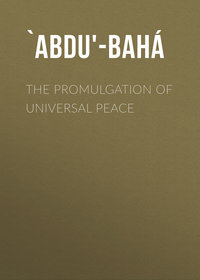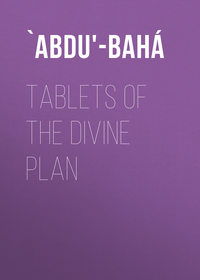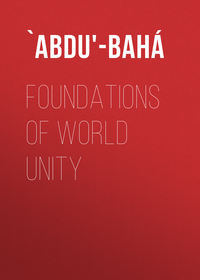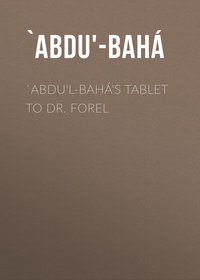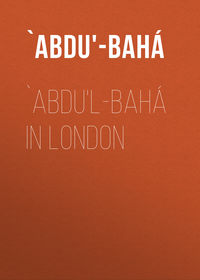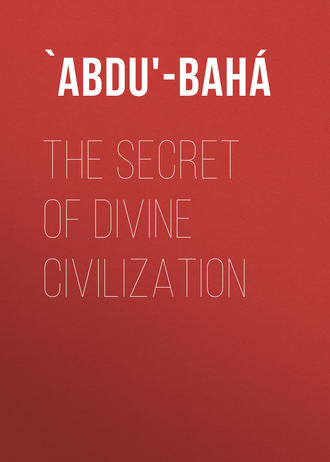 полная версия
полная версияThe Secret of Divine Civilization
As to those persons who, here and there, are considered leaders of the people: because this is only the beginning of the new administrative process, they are not yet sufficiently advanced in their education to have experienced the delights of dispensing justice or to have tasted the exhilaration of promoting righteousness or to have drunk from the springs of a clear conscience and a sincere intent. They have not properly understood that man’s supreme honor and real happiness lie in self-respect, in high resolves and noble purposes, in integrity and moral quality, in immaculacy of mind. They have, rather, imagined that their greatness consists in the accumulation, by whatever means may offer, of worldly goods.
A man should pause and reflect and be just: his Lord, out of measureless grace, has made him a human being and honored him with the words: “Verily, We created man in the goodliest of forms”11—and caused His mercy which rises out of the dawn of oneness to shine down upon him, until he became the wellspring of the words of God and the place where the mysteries of heaven alighted, and on the morning of creation he was covered with the rays of the qualities of perfection and the graces of holiness. How can he stain this immaculate garment with the filth of selfish desires, or exchange this everlasting honor for infamy? “Dost thou think thyself only a puny form, when the universe is folded up within thee?”12
Were it not our purpose to be brief and to develop our primary subject, we would here set down a summary of themes from the Divine world, as to the reality of man and his high station and the surpassing value and worth of the human race. Let this be, for another time.
The highest station, the supreme sphere, the noblest, most sublime position in creation, whether visible or invisible, whether alpha or omega, is that of the Prophets of God, notwithstanding the fact that for the most part they have to outward seeming been possessed of nothing but their own poverty. In the same way, ineffable glory is set apart for the Holy Ones and those who are nearest to the Threshold of God, although such as these have never for a moment concerned themselves with material gain. Then comes the station of those just kings whose fame as protectors of the people and dispensers of Divine justice has filled the world, whose name as powerful champions of the people’s rights has echoed through creation. These give no thought to amassing enormous fortunes for themselves; they believe, rather, that their own wealth lies in enriching their subjects. To them, if every individual citizen has affluence and ease, the royal coffers are full. They take no pride in gold and silver, but rather in their enlightenment and their determination to achieve the universal good.
Next in rank are those eminent and honorable ministers of state and representatives, who place the will of God above their own, and whose administrative skill and wisdom in the conduct of their office raises the science
[Pages 21–40]
of government to new heights of perfection. They shine in the learned world like lamps of knowledge; their thinking, their attitudes and their acts demonstrate their patriotism and their concern for the country’s advancement. Content with a modest stipend, they consecrate their days and nights to the execution of important duties and the devising of methods to insure the progress of the people. Through the effectiveness of their wise counsel, the soundness of their judgment, they have ever caused their government to become an example to be followed by all the governments of the world. They have made their capital city a focal center of great world undertakings, they have won distinction, attaining a supreme degree of personal eminence, and reaching the loftiest heights of repute and character.
Again, there are those famed and accomplished men of learning, possessed of praiseworthy qualities and vast erudition, who lay hold on the strong handle of the fear of God and keep to the ways of salvation. In the mirror of their minds the forms of transcendent realities are reflected, and the lamp of their inner vision derives its light from the sun of universal knowledge. They are busy by night and by day with meticulous research into such sciences as are profitable to mankind, and they devote themselves to the training of students of capacity. It is certain that to their discerning taste, the proffered treasures of kings would not compare with a single drop of the waters of knowledge, and mountains of gold and silver could not outweigh the successful solution of a difficult problem. To them, the delights that lie outside their work are only toys for children, and the cumbersome load of unnecessary possessions is only good for the ignorant and base. Content, like the birds, they give thanks for a handful of seeds, and the song of their wisdom dazzles the minds of the world’s most wise.
Again, there are sagacious leaders among the people and influential personalities throughout the country, who constitute the pillars of state. Their rank and station and success depend on their being the well-wishers of the people and in their seeking out such means as will improve the nation and will increase the wealth and comfort of the citizens.
Observe the case when an individual is an eminent person in his country, zealous, wise, pure-hearted, known for his innate capacity, intelligence, natural perspicacity—and is also an important member of the state: what, for such an individual, can be regarded as honor, abiding happiness, rank and station, whether in the here or the hereafter? Is it a diligent attention to truth and righteousness, is it dedication and resolve and devotion to the good pleasure of God, is it the desire to attract the favorable consideration of the ruler and to merit the approval of the people? Or would it, rather, consist in this, that for the sake of indulging in feasts and dissipations by night he should undermine his country and break the hearts of his people by day, causing his God to reject him, and his sovereign to cast him out and his people to defame him and hold him in deserved contempt? By God, the mouldering bones in the graveyard are better than such as these! Of what value are they, who have never tasted the heavenly food of truly human qualities, and never drunk of the crystalline waters of those bounties which belong to the realm of man?
It is unquestionable that the object in establishing parliaments is to bring about justice and righteousness, but everything hinges on the efforts of the elected representatives. If their intention is sincere, desirable results and unforeseen improvements will be forthcoming; if not, it is certain that the whole thing will be meaningless, the country will come to a standstill and public affairs will continuously deteriorate. “I see a thousand builders unequal to one subverter; what then of the one builder who is followed by a thousand subverters?”
The purpose of the foregoing statements is to demonstrate at least this, that the happiness and greatness, the rank and station, the pleasure and peace, of an individual have never consisted in his personal wealth, but rather in his excellent character, his high resolve, the breadth of his learning, and his ability to solve difficult problems. How well has it been said: “On my back is a garment which, were it sold for a penny, that penny would be worth far more; yet within the garment is a soul which, if you weighed it against all the souls in the world, would prove greater and nobler.”
In the present writer’s view it would be preferable if the election of nonpermanent members of consultative assemblies in sovereign states should be dependent on the will and choice of the people. For elected representatives will on this account be somewhat inclined to exercise justice, lest their reputation suffer and they fall into disfavor with the public.
It should not be imagined that the writer’s earlier remarks constitute a denunciation of wealth or a commendation of poverty. Wealth is praiseworthy in the highest degree, if it is acquired by an individual’s own efforts and the grace of God, in commerce, agriculture, art and industry, and if it be expended for philanthropic purposes. Above all, if a judicious and resourceful individual should initiate measures which would universally enrich the masses of the people, there could be no undertaking greater than this, and it would rank in the sight of God as the supreme achievement, for such a benefactor would supply the needs and insure the comfort and well-being of a great multitude. Wealth is most commendable, provided the entire population is wealthy. If, however, a few have inordinate riches while the rest are impoverished, and no fruit or benefit accrues from that wealth, then it is only a liability to its possessor. If, on the other hand, it is expended for the promotion of knowledge, the founding of elementary and other schools, the encouragement of art and industry, the training of orphans and the poor—in brief, if it is dedicated to the welfare of society—its possessor will stand out before God and man as the most excellent of all who live on earth and will be accounted as one of the people of paradise.
As to those who maintain that the inauguration of reforms and the setting up of powerful institutions would in reality be at variance with the good pleasure of God and would contravene the laws of the Divine Law-Giver and run counter to basic religious principles and to the ways of the Prophet—let them consider how this could be the case. Would such reforms contravene the religious law because they would be acquired from foreigners and would therefore cause us to be as they are, since “He who imitates a people is one of them”? In the first place these matters relate to the temporal and material apparatus of civilization, the implements of science, the adjuncts of progress in the professions and the arts, and the orderly conduct of government. They have nothing whatever to do with the problems of the spirit and the complex realities of religious doctrine. If it be objected that even where material affairs are concerned foreign importations are inadmissible, such an argument would only establish the ignorance and absurdity of its proponents. Have they forgotten the celebrated hadíth (Holy Tradition): “Seek after knowledge, even unto China”? It is certain that the people of China were, in the sight of God, among the most rejected of men, because they worshiped idols and were unmindful of the omniscient Lord. The Europeans are at least “Peoples of the Book,” and believers in God and specifically referred to in the sacred verse, “Thou shalt certainly find those to be nearest in affection to the believers, who say, ‘We are Christians.’”13 It is therefore quite permissible and indeed more appropriate to acquire knowledge from Christian countries. How could seeking after knowledge among the heathen be acceptable to God, and seeking it among the People of the Book be repugnant to Him?
Furthermore, in the Battle of the Confederates, Abú Súfyán enlisted the aid of the Baní Kinánih, the Baní Qahtán and the Jewish Baní Qurayzih and rose up with all the tribes of the Quraysh to put out the Divine Light that flamed in the lamp of Yathrib (Medina). In those days the great winds of trials and tribulations were blowing from every direction, as it is written: “Do men think when they say ‘We believe’ they shall be let alone and not be put to proof?”14 The believers were few and the enemy attacking in force, seeking to blot out the new-risen Sun of Truth with the dust of oppression and tyranny. Then Salmán (the Persian) came into the presence of the Prophet—the Dawning-Point of revelation, the Focus of the endless splendors of grace—and he said that in Persia to protect themselves from an encroaching host they would dig a moat or trench about their lands, and that this had proved a highly efficient safeguard against surprise attacks. Did that Wellspring of universal wisdom, that Mine of divine knowledge say in reply that this was a custom current among idolatrous, fire-worshiping Magians and could therefore hardly be adopted by monotheists? Or did He rather immediately direct His followers to set about digging a trench? He even, in His Own blessed person, took hold of the tools and went to work beside them.
It is moreover a matter of record in the books of the various Islamic schools and the writings of leading divines and historians, that after the Light of the World had risen over Ḥijáz, flooding all mankind with Its brilliance, and creating through the revelation of a new divine Law, new principles and institutions, a fundamental change throughout the world—holy laws were revealed which in some cases conformed to the practices of the Days of Ignorance.15 Among these, Muḥammad respected the months of religious truce,16 retained the prohibition of swine’s flesh, continued the use of the lunar calendar and the names of the months and so on. There is a considerable number of such laws specifically enumerated in the texts:
“The people of the Days of Ignorance engaged in many practices which the Law of Islám later confirmed. They would not take in marriage both a mother and her daughter, and the most shameful of acts in their view was to marry two sisters. They would stigmatize a man marrying the wife of his father, derisively calling him his father’s competitor. It was their custom to go on pilgrimage to the House at Mecca, where they would perform the ceremonies of visitation, putting on the pilgrim’s dress, practicing the circumambulation, running between the hills, pausing at all the stopping-places, and casting the stones. It was, furthermore, their wont to intercalate one month in every three-year period, to perform ablutions after intercourse, to rinse out the mouth and snuff up water through the nostrils, to part the hair, use the tooth-stick, pare the nails and pluck the armpits. They would, likewise, cut off the right hand of a thief.”
Can one, God forbid, assume that because some of the divine laws resemble the practices of the Days of Ignorance, the customs of a people abhorred by all nations, it follows that there is a defect in these laws? Or can one, God forbid, imagine that the Omnipotent Lord was moved to comply with the opinions of the heathen? The divine wisdom takes many forms. Would it have been impossible for Muḥammad to reveal a Law which bore no resemblance whatever to any practice current in the Days of Ignorance? Rather, the purpose of His consummate wisdom was to free the people from the chains of fanaticism which had bound them hand and foot, and to forestall those very objections which today confuse the mind and trouble the conscience of the simple and helpless.
Some, who are not sufficiently informed as to the meaning of the divine Texts and the contents of traditional and written history, will aver that these customs of the Days of Ignorance were laws which had come down from His Holiness Abraham and had been retained by the idolaters. In this connection they will cite the Qur’ánic verse: “Follow the religion of Abraham, the sound in faith.”17 Nevertheless it is a fact attested by the writings of all the Islamic schools that the months of truce, the lunar calendar, and the cutting off of the right hand as punishment for theft, formed no part of Abraham’s Law. In any case, the Pentateuch is extant and available today, and contains the laws of Abraham. Let them refer to it. They will then, of course, insist that the Torah has been tampered with, and in proof will quote the Qur’ánic verse: “They pervert the text of the Word of God.”18 It is, however, known where such distortion has occurred, and is a matter of record in critical texts and commentaries.19 Were We to develop the subject beyond this brief reference, We would have to abandon Our present purpose.
According to some accounts, mankind has been directed to borrow various good qualities and ways from wild animals, and to learn a lesson from these. Since it is permissible to imitate virtues of dumb animals, it is certainly far more so to borrow material sciences and techniques from foreign peoples, who at least belong to the human race and are distinguished by judgment and the power of speech. And if it be contended that such praiseworthy qualities are inborn in animals, by what proof can they claim that these essential principles of civilization, this knowledge and these sciences current among other peoples, are not inborn? Is there any Creator save God? Say: Praised be God!
The most learned and accomplished divines, the most distinguished scholars, have diligently studied those branches of knowledge the root and origin of which were the Greek philosophers such as Aristotle and the rest, and have regarded the acquisition from the Greek texts of sciences such as medicine, and branches of mathematics including algebra20 and arithmetic, as a most valuable achievement. Every one of the eminent divines both studies and teaches the science of logic, although they consider its founder to have been a Sabean. Most of them have insisted that if a scholar has thoroughly mastered a variety of sciences but is not well grounded in logic, his opinions, deductions and conclusions cannot safely be relied upon.
It has now been clearly and irrefutably shown that the importation from foreign countries of the principles and procedures of civilization, and the acquisition from them of sciences and techniques— in brief, of whatsoever will contribute to the general good—is entirely permissible. This has been done to focus public attention on a matter of such universal advantage, so that the people may arise with all their energies to further it, until, God helping them, this Sacred Land may within a brief period become the first of nations.
O you who are wise! Consider this carefully: can an ordinary gun compare with a Martini-Henry rifle or a Krupp gun? If anyone should maintain that our old-time firearms are good enough for us and that it is useless to import weapons which have been invented abroad would even a child listen to him? Or should anyone say: “We have always transported merchandise from one country to another on the backs of animals. Why do we need steam engines? Why should we try to ape other peoples?” could any intelligent person tolerate such a statement? No, by the one God! Unless he should, because of some hidden design or animosity, refuse to accept the obvious.
Foreign nations, in spite of their having achieved the greatest expertness in science, industry and the arts, do not hesitate to borrow ideas from one another. How can Persia, a country in the direst need, be allowed to lag behind, neglected, abandoned?
Those eminent divines and men of learning who walk the straight pathway and are versed in the secrets of divine wisdom and informed of the inner realities of the sacred Books; who wear in their hearts the jewel of the fear of God, and whose luminous faces shine with the lights of salvation—these are alert to the present need and they understand the requirements of modern times, and certainly devote all their energies toward encouraging the advancement of learning and civilization. “Are they equal, those who know, and those who do not know?… Or is the darkness equal with the light?”21
The spiritually learned are lamps of guidance among the nations, and stars of good fortune shining from the horizons of humankind. They are fountains of life for such as lie in the death of ignorance and unawareness, and clear springs of perfections for those who thirst and wander in the wasteland of their defects and errors. They are the dawning places of the emblems of Divine Unity and initiates in the mysteries of the glorious Qur’án. They are skilled physicians for the ailing body of the world, they are the sure antidote to the poison that has corrupted human society. It is they who are the strong citadel guarding humanity, and the impregnable sanctuary for the sorely distressed, the anxious and tormented, victims of ignorance. “Knowledge is a light which God casteth into the heart of whomsoever He willeth.”
For every thing, however, God has created a sign and symbol, and established standards and tests by which it may be known. The spiritually learned must be characterized by both inward and outward perfections; they must possess a good character, an enlightened nature, a pure intent, as well as intellectual power, brilliance and discernment, intuition, discretion and foresight, temperance, reverence, and a heartfelt fear of God. For an unlit candle, however great in diameter and tall, is no better than a barren palm tree or a pile of dead wood.
The flower-faced may sulk or play the flirt,The cruel fair may bridle and coquet;But coyness in the ugly is ill-met,And pain in a blind eye’s a double hurt.”22An authoritative Tradition states: “As for him who is one of the learned:23 he must guard himself, defend his faith, oppose his passions and obey the commandments of his Lord. It is then the duty of the people to pattern themselves after him.” Since these illustrious and holy words embody all the conditions of learning, a brief commentary on their meaning is appropriate. Whoever is lacking in these divine qualifications and does not demonstrate these inescapable requirements in his own life, should not be referred to as learned and is not worthy to serve as a model for the believers.
The first of these requirements is to guard one’s own self. It is obvious that this does not refer to protecting oneself from calamities and material tests, for the Prophets and saints were, each and every one, subjected to the bitterest afflictions that the world has to offer, and were targets for all the cruelties and aggressions of mankind. They sacrificed their lives for the welfare of the people, and with all their hearts they hastened to the place of their martyrdom; and with their inward and outward perfections they arrayed humanity in new garments of excellent qualities, both acquired and inborn. The primary meaning of this guarding of oneself is to acquire the attributes of spiritual and material perfection.
The first attribute of perfection is learning and the cultural attainments of the mind, and this eminent station is achieved when the individual combines in himself a thorough knowledge of those complex and transcendental realities pertaining to God, of the fundamental truths of Qur’ánic political and religious law, of the contents of the sacred Scriptures of other faiths, and of those regulations and procedures which would contribute to the progress and civilization of this distinguished country. He should in addition be informed as to the laws and principles, the customs, conditions and manners, and the material and moral virtues characterizing the statecraft of other nations, and should be well versed in all the useful branches of learning of the day, and study the historical records of bygone governments and peoples. For if a learned individual has no knowledge of the sacred Scriptures and the entire field of divine and natural science, of religious jurisprudence and the arts of government and the varied learning of the time and the great events of history, he might prove unequal to an emergency, and this is inconsistent with the necessary qualification of comprehensive knowledge.
If for example a spiritually learned Muslim is conducting a debate with a Christian and he knows nothing of the glorious melodies of the Gospel, he will, no matter how much he imparts of the Qur’án and its truths, be unable to convince the Christian, and his words will fall on deaf ears. Should, however, the Christian observe that the Muslim is better versed in the fundamentals of Christianity than the Christian priests themselves, and understands the purport of the Scriptures even better than they, he will gladly accept the Muslim’s arguments, and he would indeed have no other recourse.
When the Chief of the Exile24 came into the presence of that Luminary of divine wisdom, of salvation and certitude, the Imám Riḍá—had the Imám, that mine of knowledge, failed in the course of their interview to base his arguments on authority appropriate and familiar to the Exilarch, the latter would never have acknowledged the greatness of His Holiness.
The state is, moreover, based upon two potent forces, the legislative and the executive. The focal center of the executive power is the government, while that of the legislative is the learned—and if this latter great support and pillar should prove defective, how is it conceivable that the state should stand?
In view of the fact that at the present time such fully developed and comprehensively learned individuals are hard to come by, and the government and people are in dire need of order and direction, it is essential to establish a body of scholars the various groups of whose membership would each be expert in one of the aforementioned branches of knowledge. This body should with the greatest energy and vigor deliberate as to all present and future requirements, and bring about equilibrium and order.




